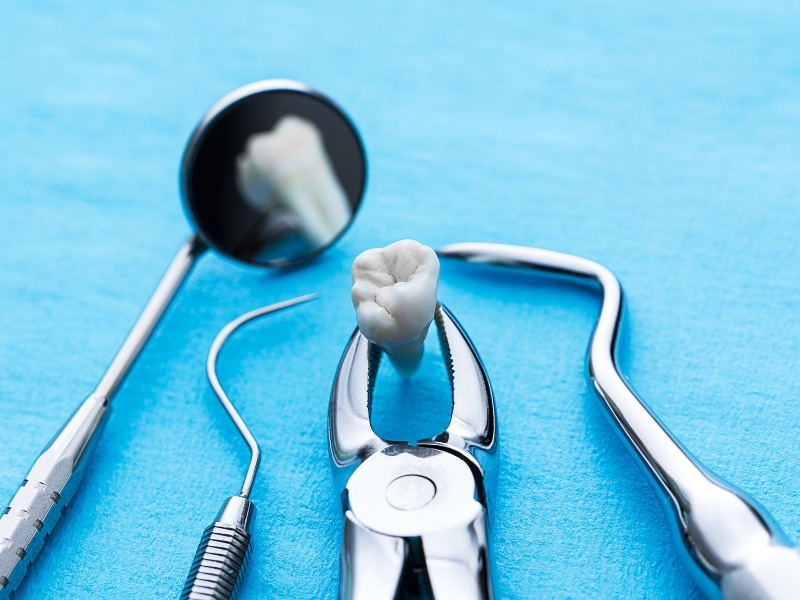An infected tooth can be a painful and concerning issue that requires timely treatment. Sometimes, an infected tooth may need to be extracted to prevent further complications. But when is it absolutely necessary to go down this route? This article explores the signs of an infected tooth, its impact on your overall health, and why extraction might be the best solution.
What are the signs of an infected tooth?
An infected tooth often presents with several distinct symptoms. Recognising these signs early on is crucial for preventing the infection from spreading.
- Severe toothache: One of the first signs of an infection is a persistent or throbbing toothache.
- Swelling in the gums: Red, swollen, or tender gums near the infected tooth are common.
- Bad breath or unpleasant taste: An infection can cause a foul taste or bad breath due to pus draining from the affected area.
- Sensitivity to hot or cold: A tooth with an infection may become extremely sensitive to hot or cold foods and drinks.
- Fever: A fever could indicate that the infection is spreading and needs immediate attention.
If you’re experiencing any of these symptoms, it’s important to see a dentist as soon as possible for diagnosis and treatment. An infected tooth should not be ignored, as it can lead to more severe health complications if left untreated.
How does an infected tooth affect your overall health?
While an infected tooth might seem like a localised issue, it can have widespread effects on your overall health. Untreated tooth infections can lead to:
- Spread of infection: The infection can spread to surrounding tissues, including the gums and jawbone, and even into the bloodstream, causing conditions like sepsis.
- Pain and discomfort: An untreated infection can lead to chronic pain, affecting one’s ability to eat, speak, or even sleep.
- Risk to heart health: In rare cases, an untreated infection can increase the risk of heart conditions such as endocarditis, a serious infection of the heart’s lining.
It’s vital to treat tooth infections promptly to avoid these complications. Regular dental check-ups can help catch any potential problems before they become severe.
Why is tooth extraction sometimes necessary for infected teeth?
When a tooth is severely infected or damaged, a dentist may recommend extraction as the best course of action. Tooth extraction may be necessary for the following reasons:
- Severe decay or damage: If a tooth is extensively decayed or fractured, it may not be able to be saved by treatments like a root canal.
- Abscess or cyst formation: An abscess or cyst near the tooth could indicate that the infection has reached deeper tissues. If not addressed, this can lead to further complications.
- Failure of other treatments: Extraction may be the only viable option if a root canal or antibiotics do not eliminate the infection.
While tooth extraction may seem extreme, it’s often the best way to preserve the health of the surrounding teeth and prevent the infection from spreading. Additionally, regular dental check-ups, proper oral hygiene, and a healthy diet play a vital role in preventing periodontal disease and helping to maintain healthy gums and teeth for the long term.
What are the risks of delaying a tooth extraction?
Delaying the extraction of an infected tooth can lead to several risks:
- Spread of Infection: The infection could spread to nearby teeth, gums, or even the jawbone, leading to more serious health issues.
- Systemic Health Issues: In rare but serious cases, a spreading infection can affect other body parts, including the heart and kidneys.

It’s always better to address an infected tooth as soon as possible. Waiting too long could lead to more extensive treatment and a longer recovery time. Additionally, understanding the factors that influence tooth extraction recovery can help you prepare for a smoother and quicker healing process.
What are your treatment options before resorting to an extraction?
Before opting for extraction, there are several treatments your dentist may consider to save your tooth:
- Root canal therapy: If the infection is confined to the tooth’s pulp, a root canal may effectively remove the infected tissue and save the tooth.
- Antibiotics: In some cases, antibiotics may be prescribed to help control the infection, but they typically aren’t a permanent solution.
- Tooth filling: If the tooth has minor decay, a filling may be sufficient to restore its function and protect it from further damage.
If you’re experiencing discomfort due to an infected tooth, wisdom tooth pain relief tips can provide temporary relief, but it’s important to consult a dentist for long-term solutions to prevent further complications. Your dentist will assess your situation and recommend the most appropriate treatment based on the severity of the infection and the overall health of your tooth.
How can you prevent tooth infections in the future?
Preventing future tooth infections involves maintaining good oral hygiene and being proactive with your dental health:
- Brush and floss regularly: Brushing your teeth twice daily and flossing can help prevent cavities and infections.
- Visit your dentist regularly: Regular check-ups and cleanings allow your dentist to catch any problems early, preventing serious infections.
- Limit sugary foods: A diet high in sugar can contribute to tooth decay, which increases the risk of infection.
- Address dental problems early: If you notice any symptoms of infection, visit your dentist right away to prevent further complications.
By following these simple steps, you can reduce the risk of infections and maintain good oral health for years.
Why choose a trusted dentist for tooth extraction and infection management?
When dealing with a tooth infection or the need for tooth extraction, it’s essential to choose a trusted and experienced dentist to ensure the best outcome. Here are some reasons why choosing the right dentist is important:
- Personalised Care: A trusted dentist provides individualised care, taking the time to understand your unique needs. This approach ensures you receive treatments tailored to your specific dental health.
- Multilingual Support: Dental professionals who offer services in multiple languages can help ensure clear communication, which is especially important for patients who may not be fluent in the practice’s primary language. This fosters an environment of trust and comfort.
- Advanced Technology: Dentists who use the latest dental technologies, such as 3D-printed restorations and precise imaging tools, can provide more accurate diagnoses and effective treatments. Modern technology can improve the efficiency of procedures, reduce discomfort, and speed up recovery times.
Book your consultation with Marsfield Dental Care
If you’re experiencing signs of a tooth infection, don’t wait. Marsfield Dental Care offers expert dental care and tooth extraction services to help you maintain optimal oral health. Our patients trust our dentists, who have years of experience providing thorough, gentle, and efficient care. One long-time patient shared that they’ve never trusted anyone more with their dental health, praising our team’s professionalism.
As a family-owned practice, we are committed to providing personalised care for every member of your family.
Contact Marsfield Dental Care for a consultation and experience the high-quality care that keeps our patients coming back. We’re here to help you get the relief you need and ensure your smile stays healthy for years.
Frequently Asked Questions
- Can a tooth infection go away on its own?
No, infections need treatment to prevent worsening or spreading.
- How long can you wait before needing a tooth extraction?
It depends on the infection’s severity. Early treatment can save the tooth, but delays may require extraction.
- What should I do if I have a tooth abscess?
Seek dental care immediately. Treatment may include draining, antibiotics, or a root canal/extraction.
- Can I have an infected tooth treated with antibiotics alone?
Antibiotics may reduce the infection, but further treatment, like a root canal or extraction, is usually necessary.
- How do I know if I need a root canal or extraction?
A root canal is for less severe cases, while extraction is needed if the tooth is too damaged.
- Are there any home remedies for a tooth infection?
Home remedies can help temporarily, but professional care is essential for proper treatment.
- How painful is a tooth extraction?
Extraction is done under local anaesthesia, so you won’t feel pain, though some discomfort may follow.
- What is the recovery time after a tooth extraction?
Recovery typically takes 1-2 weeks, with swelling and discomfort gradually subsiding.
- Can a tooth infection spread to other teeth?
Yes, untreated infections can spread, causing more damage.
- Will an infected tooth always require an extraction?
Not always; early treatment or a root canal can save the tooth. Extraction is a last resort.
Disclaimer: This analysis is for informational purposes only and does not constitute medical advice. Always consult a qualified dental professional for any concerns about oral health.

